Craft Show Survival
You & the Organisers
You & other Stall holders
You & the Visitors
You & Disappointment
You & the Organisers
It is worth befriending the organisers, especially on set-up day.
Never have a go at them, however stressed or let down you feel, as only they can put it right.
When the stall furniture is not there, your sign is misspelt, and you are not in the catalogue; remember its normal. It’s not personal. Sort out the problems in sensible order and go for it patiently, politely and persistently.
In this disaster list, sort the tables first, because you can’t set up without them. On a big show everyone sends you on to someone else. Organisers are nabbed every second to trouble-shoot. You have to keep following up.
If you have a major issue, deal with it after the first day. They don’t care at the end of the show but at the beginning they don’t want the stall holders to get restive, so they will listen.
The organisers can find you a trolley, give you an extra chair, offer you a discount, allocate you a corner stall, keep in with them.
You & other stall holders
Getting on with your fellow stall holders is obviously a good thing, especially when you are doing a show alone and need the back up for loo and drink forays.
But remember you are going to hear them pitching the same stuff all day long, you are witness to their deep insincerity and they are witness to yours. They are not your new best friend. Chatting away can be exhausting; go gently.
You & the visitors
In a busy show your visitors are buffeted, bemused, hungry & hot; or hungry & cold. The show is a struggle.
In an empty show your visitors are self-conscious ( all the stall holders are watching them) and unenthusiastic. Just as at an empty restaurant: you expect the food to be no good.
A smile is all the greeting they need.
Once they begin to look in earnest, say a little more. Just a snippet of information about your work. So a potter might say its all wood fired It doesn’t matter what you say, it’s just telling the visitor I am here to help, its my work
Let the visitor look peacefully, don’t chat at them.
They will let you know when they are ready to talk; but if they talk a great deal, do not expect them to buy. The talkers usually don’t.
Intense silence, a distracted look and work handling are buying signs. The distracted look is them thinking how they would use your work.
They are looking, better still they are looking in competition, they are selling to themselves, leave them alone.
Sometimes you see people doing all this and then they are gone and nothing purchased.
Don’t worry, many buyers will do a first round, see what they want, then come back later and make their purchases.
When they come back, they go through the looking again to be certain. If you know it’s a revisit say something like “I thought you would be back, you were looking earlier” That helps to lock them in
Once it comes to helping or paying, then social chat is all good. They will naturally go off and show other people their purchases and the more they feel you like them as people, the more they will market you.
Some buyers need support in making their choices, you are the expert so help them to choose. It is very important that they leave your stall feeling confident and happy that they have made a wise purchase. Don’t just support their choice actually contribute to the deciding.
This is a huge problem. One is interested the other wants to move on. The uninterested one distracts and puts off the interested one and the sale is lost. Do your best to engage the less interested one, not with your work but just in chit-chat. Your chit-chat is buying time for the other one to look at your work properly. Sundays are always the worst days for this when the family comes and no one is happy. Sundays are for ticket sales, not yours.
Don’t sit, Don’t eat and drink and Don’t read on your stand.
Don’t be so bloody silly you can do all of those. You have to survive a long hard day, do what you need to do.
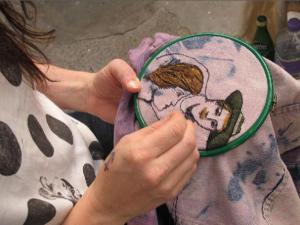 Working on something when you are not busy encourages visitors to talk to you about your work and shows you are the maker and wastes a bit less of your time.
Working on something when you are not busy encourages visitors to talk to you about your work and shows you are the maker and wastes a bit less of your time.
You & Disappointment
Manage your expectations.
Here we are first show, how did it go ?
I had no idea what to expect. I was simultaneously so nervous that I wouldn’t sell a thing and so nervous that I didn’t have enough inventory. It turns out, I sold lots, I didn’t sell out, I about broke even, I got great feedback, I met amazing people, and I left the fair brimming with new ideas and feeling incredibly inspired and motivated.
To be pleased to break even is a low goal but look how happy it left her. Lets hope she works out that her prices have to go up as to sell lots and break even is not a very business like place to be.
Redo your display mid show
When a show is going badly talk to your neighbours they may see where you are going wrong. Advice on rearranging your stall can find you some sales.
Also after the first day you know the visitor flow direction so you can redo your display to max that sight line.
Consider taking out of the display anything that is not earning its place.
At the very least, re doing your stand will give you an injection of hope which will help your state of mind and ability to sell.
Do not, absolutely do not, drop your prices. That will not be the problem. It will simply mean that the sales you do make will do less to help your parlous situation. A bad show could even be an argument for putting them up. People tend to respect big prices more than bargain basement ones. You only need half the buyers if you double your prices.
When the show is a disaster for you but the other stalls are making fortunes
This is such a dispiriting situation but stay logical:
I am doing a new show
It is a gamble
It has not worked
But I knew it was a risk
It reflects on the show, not my work .
It means the show is wrong for me, but the only way I could find that out was by trying.
When the show is a disaster for everyone
They happen, those Where the hell were the customers? shows, they are annoying, boring and expensive. Get drunk.
Extras
This is part three of three posts on shows
Part One was on Picking the right show
Part Two was on Preparations for your show
If you struggle with feeling Confident then acquire The Coat of Arrogance
If you want one to one help with your business then this is current deal.
Talk to me in The Comments and if I helped please share the post.



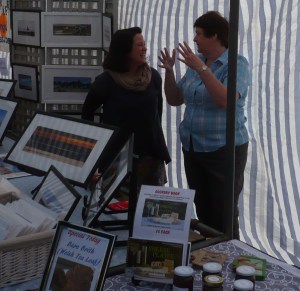
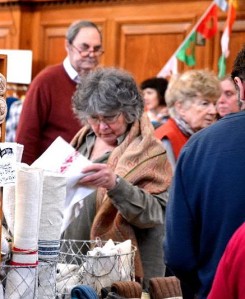
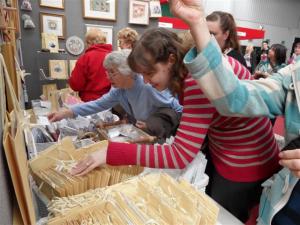

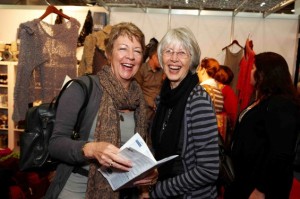
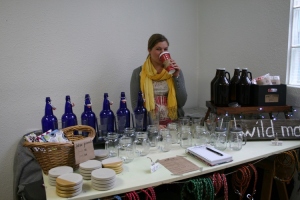
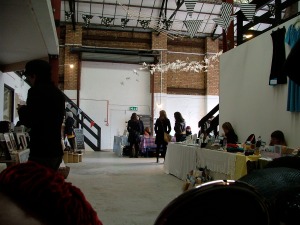
Hi Dixie,
Thank you for this series of articles. Your blog provides just the kind of advice I was looking for.
I am just preparing for my first craft fair in many years, first one to sell a coherent collection of items. I would definately like to book 121 session with you once I get my business up and running in few months.
That’s great just use the contact form on the Meal Deal page and we will sort it out when you are ready
glad to see you don’t advocate aggressive selling, it’s not my nature, and I find myself playing a delicate to and fro with the attendees sometimes: they don’t want eye contact, you manage to flash a smile at them; they come back three times, you initiate a little explanation of technique, and eventually they ask for help on their decision … a sale made. that was one customer at potfest in the pens last August!
I agree Jane, it is like a very subtle mating dance; but we both sell expensive things. Clothes pegs don’t take the same delicacy.
I do remember how I used to get really excited because customers would pick up a big handful of buttons sets and that delighted leaper who lives in your tummy ready for a whopping sale was already practising, only to find they then decide between those sets.
As a committee member (and ex chair) of an annual large charity fair in the north of England can I second everything you have said. And also remember the organisers are nervous too. We need the fair to be a success so that we can raise funds for our charities. We need you to sell too!
Thats a good point about having a common interest. But in the gigantic shows its about ticket sales for the organisers on Sundays. Its almost always a rotten day for takings.
We don’t do Sundays. We have had many discussions over the past years (we are 25 years old now) about what days are best. We currently do Wednesday and Thursday but there is a strong feeling that we should do Thursday and Friday. Oddly enough when we checked the CFA website Friday is the least popular day for shows.